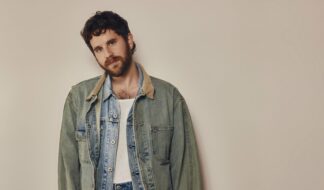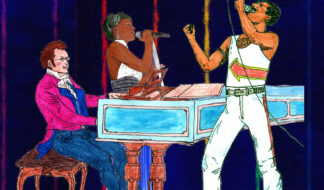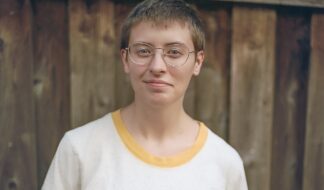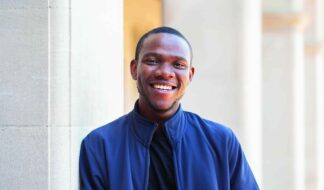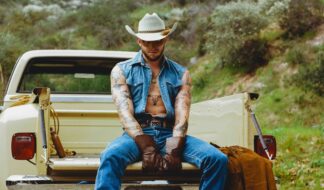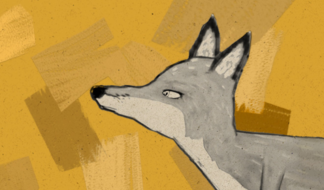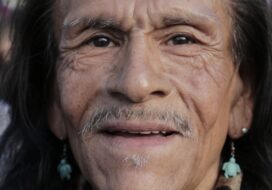Three years after the Pale Waves' breakout album "My Mind Makes Noises," the band is back bolder and gayer than ever with "Who Am I?" On tracks like "She's My Religion," "Easy," and "You Don't Own Me," frontwoman Heather Baron-Gracie explores many firsts. She unabashedly puts her sexuality front and center by highlighting her love for girlfriend Kelsi Luck, takes a hard look at what it means to be a woman, and digs deep to explore a commentative lyrical side not yet seen because, as Baron-Gracie puts it, on the first album "it wasn't in me."
"Who Am I?" also updates Pale Waves' sound. Instead of lighter, synth-forward tracks, the tone here is thrashier and harsher, though it still maintains the band's trademark airy feel while exploring serious topics. Perhaps ironically for an album named "Who Am I?", Baron-Gracie says she spent much of her time looking outward to write this album. But given the context of the powerful outside factors that the U.K.-based band was facing in 2020, it seems inevitable. Last year involved a serious tour bus crash, Baron-Gracie's unintentional isolation in the states during production, and compounding burnout from a previously non-stop schedule.
Amidst a hectic release week, Baron-Gracie filled PrideSource in on the previously untapped creative freedom she felt while recording "Who Am I?", the artistic growth that needed to happen for her to come out in her professional career, and why she's choosing to use her platform to be a healthy role model for younger LGBTQ+ fans.
I especially like the nod to the early 2000s that's a part of your album. It's a departure from the '80s sound you had on your first release. What made you switch?
I had more creative control in terms of the direction I wanted the second album to go in and, for me, I love alternative music more than '80s music and I wanted the second record to feel a lot more real and authentic. I wanted to sort of switch out the synths for the guitars, so it was a really natural decision: This is going to be more alternative and it's gonna have loads more guitars and it's gonna feel more robust rather than programmed.
On this record, you're very open about your own queer identity in songs like "She's My Religion" and "Easy." You've said before that you'd like to be a voice for LGBTQ+ people and write songs in a "smart way." What do you mean by that?
Well, I could have just wrote "Easy," but then thrown in the pronouns of "she" and "her." "She keeps the lights on for me / she helps me to believe." And I didn't think that would have done it justice. This was the first time that I was being so open about my sexuality and being so real and honest and I didn't want it to just be a straight-up pop love song. I wanted people to sort of really dissect the lyrics and I wanted it to have a lot more thought. And "She's My Religion," to me, is more of a love song than "Easy" because the whole theme of it is: I love you entirely, and I love these things that aren't seen as perfect, whether that's mental health, or their lifestyle, etcetera.

Photo credit: Tom Pullen.
Why did you decide to be more open about your sexuality on this album?
I was 23 when I wrote the first album and I was still finding myself a lot more, and I was always aware of my sexuality, but I hadn't yet owned it. And there's a difference between being aware and then owning it. I couldn't write a song like "She's My Religion" on the first album. It just wasn't in me, and I don't think I had the ability to. I think I needed those years to grow and to mature and become a lot more comfortable with my sexuality and also be willing to let people in more. As an artist, you don't know how much to give away and how much to keep for yourself, but I felt like I owed it to the LGBTQ+ community to be out. I have somewhat of a platform, so I should represent a healthy same-sex relationship because we don't have a lot of healthy representation out there.
Often in LGBTQ+ media it does seem like there's a caveat regarding love. At least from my perspective, it is refreshing that it's healthy.
I'm glad you think that. And really seeing how much it means to our fans, hardcore fans were aware of my sexuality. I never tried to hide it; it's just that I wasn't very public about it in terms of my music and songs that I wrote. But now that it is so displayed within this album, even more so with the music video that we did for it, it's really connecting with our fans, and they feel happy to know that they have a healthy representation. I literally received so many messages when the "She's My Religion" music video dropped, because people couldn't believe it! They were like, "Wow, this displays a relationship in a healthy way." And not in a way that is kind of an experiment or overly sexualized. It's just a normal relationship.
And nobody dies in it!
Yeah (laughs). Nobody dies.
Stylistically, maybe it was better to explore deeper topics on an album where you have more artistic control.
Yeah, you need that sort of really thrash, distorted, angry, aggressive guitar. Whereas, on the first album, I felt like the guitars that we wrote were more chorus and more picky, '90s-feeling and rhythmical.
Beyond LGBTQ+ themes, you make a lot of statements on this album about what it means to be a woman and misogyny. Did you also have to build up maturity to approach those topics?
Yeah, 23-year-old me couldn't write a song like "You Don't Own Me." I was still finding my feet a lot with songwriting and educating myself and figuring out how to write a song like "You Don't Own Me." Even if you look back and compare the songwriting on album one and album two, there's definitely a shift and there's definitely more of a development, which is good, which is natural, which is exactly what I want to continue to do. I want to continue to be able to write that and have even more powerful statements. It's just all about having the knowledge to be able to do that as well. I feel like when I was 23, if I had tried to write a song like, "You Don't Own Me," it wouldn't have turned out as well.
Obviously, COVID-19 is not ideal from a performance or production perspective. How will that affect touring and connecting with fans this album cycle?
A lot of it had to be rearranged. Usually, we would travel around the U.K. and meet our fans and put on an acoustic show. None of that will happen. It's more just about: hat can we do online? How do we take this on social media and over the internet? And how do we keep that connection going and flowing?
So, we've just been trying to plan various things so that we can continue to have that continuous connection. Because that's really important to us as a band. Our fans mean so much, and I want to know what they think of the record, and I want to have those conversations with them. It's all about what can we do online and what can we do that's safe? We have a tour booked, but it's for next year.

Photo: Tom Pullen
Do you think your interpretation of these songs may change when you finally head out on tour next year?
Yeah, who knows? It could. It really could! I had some songs on the first album that I look back on now and think, "Wow, that's what I actually meant." Or I have a totally different perspective about that. I wrote about this one person, that person's no longer in my life — they're gone. And now it makes me laugh to think about the song and the meaning. I won't go into detail (laughs). But I don't feel like I have too much negativity around any of our Pale Waves songs. The first record was quite lighthearted in terms of writing about other people. A lot of it was mainly about the way I felt, but this second album does talk about other people, not just me.
Why did you make the decision to be a positive role model?
I do feel a bit of responsibility. And there is pressure there. But when I was growing up I felt like I didn't really have that sort of person to look up to when I was younger. I really missed that and I lacked that, so I know what it feels like to not have (that) the person to look up to and, in a way, to sort of guide you in ways that you don't have around you. If I can do that for any of my fans, if I can fill that gap or be just anything that they can look up to, then I will definitely take on that role.
But I always tell everyone that I'm not perfect. I'm far from perfect; I'm just being me. And I do think that I'm a decent human being, and I stand for what's right in the world and I want to represent the LGBTQ+ community in the healthiest way. So, I will continue to do that, but I'm definitely not perfect. But if I can improve their lives and if I can make them feel more comfortable and feel like they have an understanding, then I will continue just being me and trying to help them as much as I can.
Learn more about the band on palewaves.co.uk.

